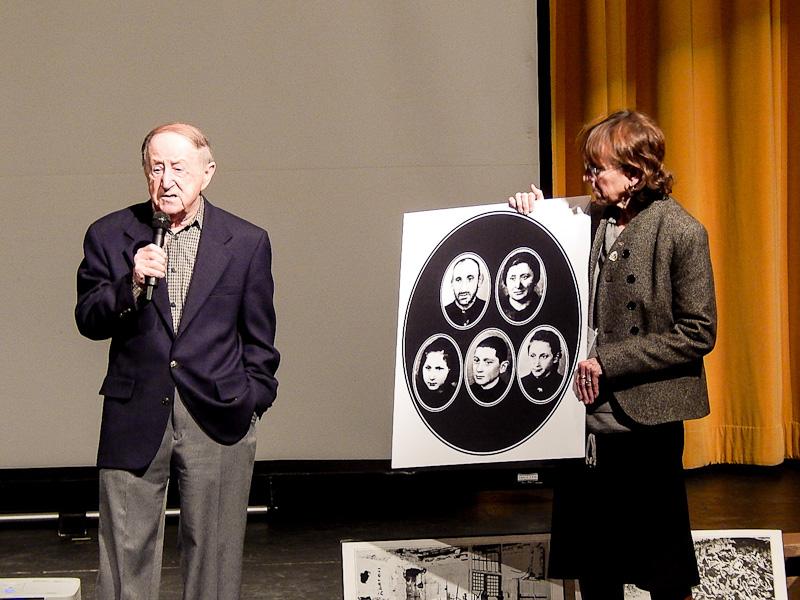Seniors learn life lessons from Holocaust program
Assisted by Senior Project Coordinator Louise Geczy, Holocaust survivor Rubin Sztajer speaks to seniors from various high schools in Maryland about his experience during the genocide. JC hosted the Lessons of the Holocaust Program for the first time on Wednesday, Feb. 5.
For the first time, JC hosted the Lessons of the Holocaust Program. The event took place on Wed. Feb. 5. The program’s purpose is “to make [high school students] aware of the lessons from the Holocaust and modern-day genocide,” Senior Project Coordinator Louise Geczy said.
The program, sponsored by the Jewish Museum of Baltimore, the Baltimore Jewish Council, and An Agency of the Associated, was held at JC in order for the program to gain new interest and to prevent it from dying out, according to Geczy. It was previously held in communities with a Jewish influence.
Having this event at JC “broaden[s] the perspective so that you’re not focusing on just Jewish-Catholic schools,” she said. “[Those in charge of the Lessons of the Holocaust Program] know that we have a very strong Holocaust education here.”
Senior honors English teacher Deborah Stathes’ 39 students were required to attend the event. However, due to the snow day, around 20 JC students were present, according to Geczy. Students and faculty from 15 other high schools also attended. In total, there were 75 students and 25 teachers.
Guest speakers at the Lessons of the Holocaust Program included a rabbi and a priest to talk about Jewish-Catholic doctrine, an assistant professor from the University of Baltimore to speak about modern-day genocide, and a speaker from the Jewish Foundation of the Righteous to discuss the rescue of Jews during the Holocaust. Additionally, Holocaust survivor Rubin Sztajer spoke.
“I think the more we share ideas together, the greater our level of understanding rises,” Geczy said.
Senior Carley Bynion was able to talk with Sztajer one-on-one after the program. “He was able to go more in-depth with me,” Bynion said. “I’ll never forget the things he said.”
Bynion benefited from the talk given by Sztajer during the Lessons of the Holocaust Program, as well as from their one-on-one talk. Bynion said she learned life lessons and about “the way [Sztajer] looks at life now.” Additionally, “I have a different aspect of the Holocaust now,” she said.
According to Bynion, meeting a survivor has a different impact than reading about survivors.
“Being able to interact with them takes it to a whole new level. Everyone there was really engaged and asking questions,” Bynion said. She found that the students acted more “mature” than at different programs and assemblies offered through JC.
JC students, in addition to participating, had to be good hosts to the students from other schools and had to help things run smoothly, according to Geczy.
Senior Taylor Gerber’s favorite part of the event was the lunch period given. During this time, the JC seniors had the chance to interact with students from different high schools. “I wish there were more people there,” Gerber said. This would have been accomplished “if it had not been for the weather,” he said.
“They were part of the student group, but we also asked them to lead the groups in the sense that they used their laptops to create the WordClouds, and they sort of coordinated the small groups,” she said.
The student groups were given the activity to create online word art using programs such as WordCloud and Wordle. The words that students chose to use in this digital word art were associated with the Holocaust and genocide. Bynion’s group chose words such as “hatred,” “strength,” “violence,” “endurance,” and “survival.”
This program was an additional event to the senior class’s study of the Holocaust. It is, according to Geczy “another component” of the class learning of the Holocaust.
“It was a success,” Gerber said.
The leaders of the program agreed with Gerber. According to Geczy, “they’ve already asked if we would want to [host] again next year.”
Lauren Glase is a News Editor for The Patriot and jcpatriot.com.



